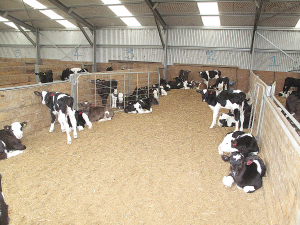DairyNZ Levy Vote Underway as Chair Highlights Seven-Fold Return
Voting has started for the renewal of DairyNZ's milksolids levy.
 Young calves should be housed for at least 4 weeks to ensure they stay warm and are using their energy for growth.
Young calves should be housed for at least 4 weeks to ensure they stay warm and are using their energy for growth.
Rearing facilities should be set-up and maintained well to ensure calves stay healthy.
Young calves should be housed for at least four weeks to ensure they stay warm and are using their energy for growth.
Housing
Spacing Calves
Feeding Facilities
Cleaning
Article: NZAgbiz
Agrisea NZ has appointed Craig Hudson as it's new chief growth officer.
State farmer Landcorp, trading as Pamu, is a forecasting a full-year net profit of around $100 million.
Tony Aitken, chief executive of Ruralco, has been awarded the Excellence in Business Leadership Award at the ANZ Business of the Year Awards.
Global trade has been thrown into another bout of uncertainty following the overnight ruling by US Supreme Court, striking down President Donald Trump's decision to impose additional tariffs on trading partners.
Controls on the movement of fruit and vegetables in the Auckland suburb of Mt Roskill have been lifted.
Fonterra farmer shareholders and unit holders are in line for another payment in April.
OPINION: Staying with politics, with less than nine months to go before the general elections, there’s confusion in the Labour…
OPINION: Winston Peters' tirade against the free trade deal stitched with India may not be all political posturing by the…